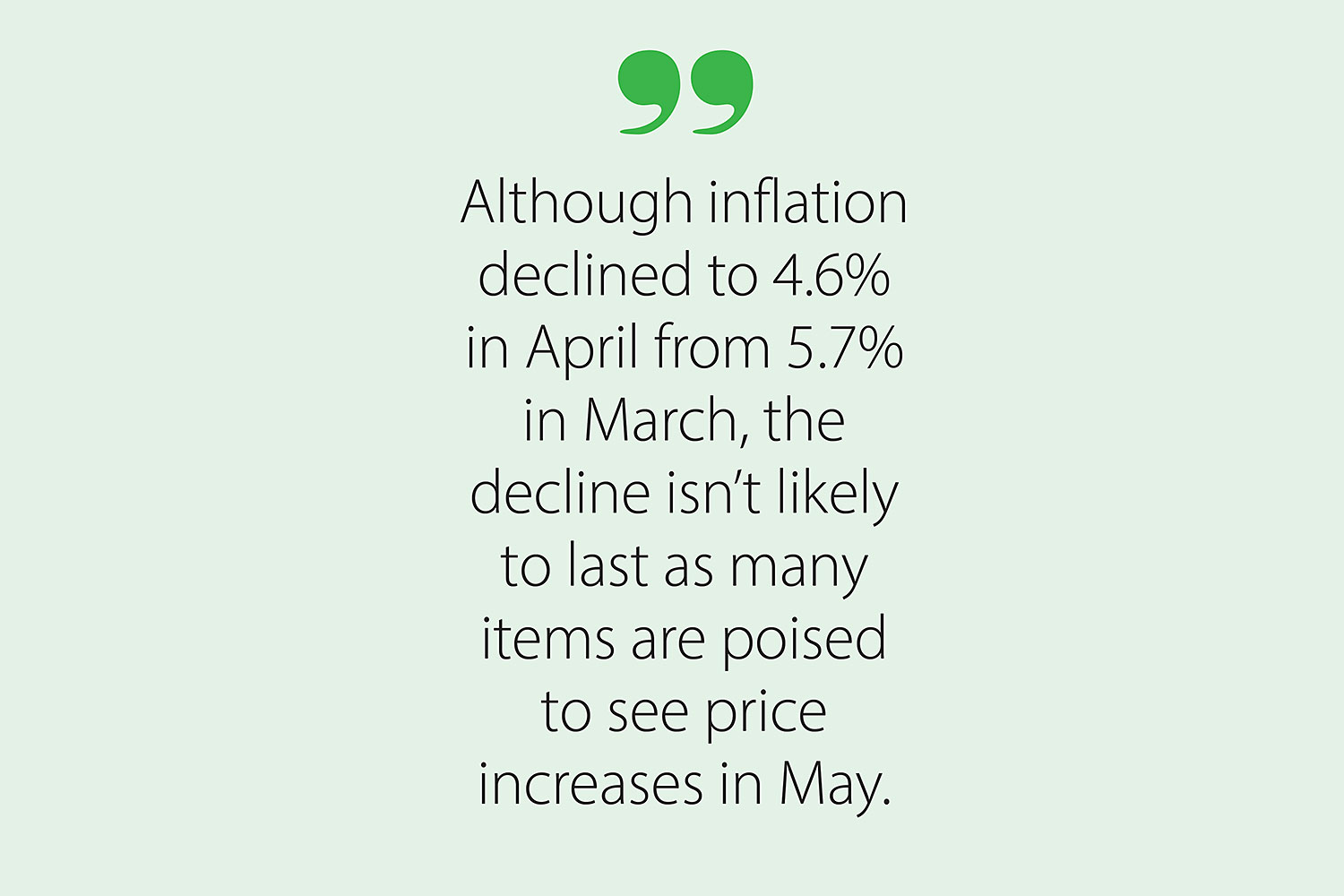
April typically is the weakest month for share trading activity given the large number of holidays and the low number of trading days. It's not surprising, then, that average trading turnover for the month was just 72 billion baht, down almost 20% from 89 billion baht in March.
With all the prevailing uncertainties, the SET moved mostly sideways during the month, closing down 2% from the end of March at 1,667.44 points. The macro pressures from March continued into April, including the Russia-Ukraine war, high global energy prices and inflation rates, affecting prices for many commodities, such as feedstock, fertilisers and food. Thai economic conditions are now at the mercy of these factors.
Although inflation was only 4.6% in April, down from 5.7% in March and the lowest figure since January, the decline isn't likely to last as many items are poised to see price increases in May.
The most significant challenge is fuel prices, especially diesel. Government subsidies had kept the price under 30 baht a litre since the war in Ukraine started. In April, the subsidy amounted to 10 baht a litre but that is unsustainable. The price has now been bumped up to 32 baht and is supposed to rise to 35 baht by month's end, but the prime minister said this week that it might remain at 32 baht at least through next week. In any case, higher diesel prices would have a significant impact on Thai economic conditions.
As well, the country is bracing for additional impacts from higher feedstock costs, a hike in LPG cooking gas prices and increasing food costs. Indeed, May will be a challenging period for Thailand. Given the impact of inflation and other factors, we now expect GDP growth for the full year of just 2.8% with inflation averaging 4.8%.
TURBULENCE IN MAY
While April was challenging, early May was a near-disaster for the SET. Fears associated with the Fed increasing its policy rate and reducing its balance sheet faster than expected hammered the market. The SET plunged almost 70 points in one week and has now tumbled below the 1,600-point mark.
Surprisingly, though, foreign inflows have continued. Foreigners were still net buyers of 10.8 billion baht in April, while local institutions were net sellers of 13.1 billion and retail investors net buyers at 3.6 billion baht. For the year to date through Thursday, foreign investors have been net buyers of 117 billion baht.
The only clear positive from April was the Covid-19 situation, specifically the significant drop in daily cases. From nearly 2 million worldwide in mid-March, new daily cases are now slightly above 300,000 cases per day. Daily deaths have fallen from more than 10,000 to less than 2,000 currently. This is a solid sign that the world is getting back to normal and has encouraged many countries to reopen to tourists.
For Thailand, new cases were previously expected to surge after the Songkran festival, with predictions of anywhere between 50,000 to 100,000 a day. However, the reported figures went in the opposite direction and have remained well below 10,000, with deaths falling from triple digits to around 60 a day as of this week. This bodes well for the country and has prompted the government to lift most restrictions. As such, life is beginning to return to the pre-Covid normal.
Our investing strategy at this juncture is to wait and see; we recommend keeping 40-50% of one's total portfolio in cash. We retain a selective theme focused on the reopening of the country, with BEM, CENTEL and GFPT our picks for this month.
TRANSPORT UPTICK
The transport player BEM is a clear beneficiary of life getting back to normal. Many companies have lifted their work-from-home schemes and staff are returning to offices, with mass transit and expressway use rising. People are also increasingly venturing outside for shopping and dining and taking part in outdoor activities much more than before.
Consequently, we expect BEM's performance to improve from the second quarter onward as normalcy gradually returns. We also note that with the end of the Test & Go programme this month for foreign arrivals, tourism is recovering faster. BEM's operations should follow suit with a return to normal.
In line with the reopening theme, we see CENTEL as one of the hotel operators poised for a big turnaround this year to a net profit. With the lifting of Test & Go, we expect inbound tourist numbers to pick up, especially in the second half. The company is also looking to acquire a new brand for the food business within this year, which would create further upside for CENTEL.
For GFPT, the 15% year-on-year rise in chicken prices seen this year stands to boost the company's overall performance. We forecast net profit growth of more than 500% year-on-year in 2022 on increasing product prices, a jump in exports and increased demand for chicken meat as a substitute for pork, which has seen even steeper price rises this year.
We also note that GFPT has increased its capacity for production of chicken meat and this year will fully utilise the new capacity. In short, 2022 looks to be a big turnaround year for the company.







